
A New Hampshire ski resort bets on tech to compete with industry giants
JACKSON, N.H. — A skier since age 4, Thomas Brennick now enjoys regular trips to New Hampshire’s Black Mountain with his two grandchildren.
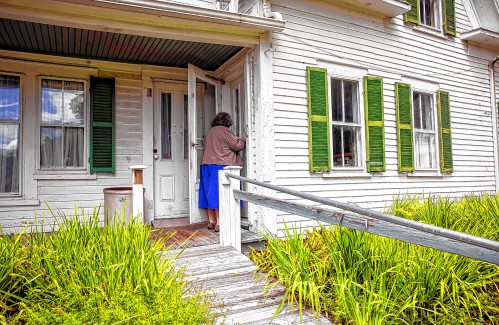
Around Concord: Eagle Pond Farm, its literary inhabitants, and the nonprofit preserving their legacy
The white farmhouse, built at the start of the 19th century, sits tucked into a grassy knoll off a bend in Route 4 with Mount Kearsarge standing watch in the distance. As you drive down the road you’d never know the richness of the history surrounding you until long after the porch and green shutters become a speck in the rearview mirror.
Most Read
 Police: Cache of drugs, gun seized in search
Police: Cache of drugs, gun seized in search
 ‘Like my child had died’: For parents trying to help their kids, New Hampshire’s mental health system forces a hard decision
‘Like my child had died’: For parents trying to help their kids, New Hampshire’s mental health system forces a hard decision
 Blasting set at Swenson Granite quarry, which may resume full operations this summer
Blasting set at Swenson Granite quarry, which may resume full operations this summer
 House committee defunds relief program for mothers and children, spares SNAP incentives
House committee defunds relief program for mothers and children, spares SNAP incentives
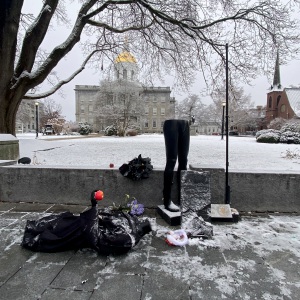 Three arrested in connection with vandalism of Satanic Temple holiday display
Three arrested in connection with vandalism of Satanic Temple holiday display
 Zach Emerson, a cross-country innovator leaving a lasting impact on Hopkinton
Zach Emerson, a cross-country innovator leaving a lasting impact on Hopkinton
Editors Picks
 More New Hampshire law enforcement departments partner with federal immigration agencies
More New Hampshire law enforcement departments partner with federal immigration agencies
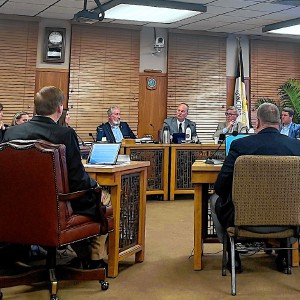 ‘That wasn’t the charge we were given’ – New city councilors question golf clubhouse options
‘That wasn’t the charge we were given’ – New city councilors question golf clubhouse options
 Sunshine Week: Searchable database of what Concord city employees were paid in 2024
Sunshine Week: Searchable database of what Concord city employees were paid in 2024
 Immigrants in New Hampshire face uncertainty as temporary protections expire soon
Immigrants in New Hampshire face uncertainty as temporary protections expire soon
Sports

Monitor names winter 2024-25 Players of the Season
Although Monday marks the first day of the NHIAA spring season with practices and tryouts happening on baseball and softball diamonds, lacrosse fields, tracks and tennis courts throughout the state, it’s been just over a week since the winter season concluded.
 Boys’ basketball: Pembroke tops Sanborn to claim D-II state title
Boys’ basketball: Pembroke tops Sanborn to claim D-II state title
Opinion

Karishma Manzur, Ph.D. is a science writer living in Exeter. She volunteers with various groups, including the New Hampshire Coalition for a Just Peace in the Middle East, which includes state chapters of Veterans for Peace, Jewish Voice for Peace, Peace Action and several other organizations.
 Opinion: Courage and care count
Opinion: Courage and care count
 Opinion: What rough beast is slouching toward us to be born
Opinion: What rough beast is slouching toward us to be born
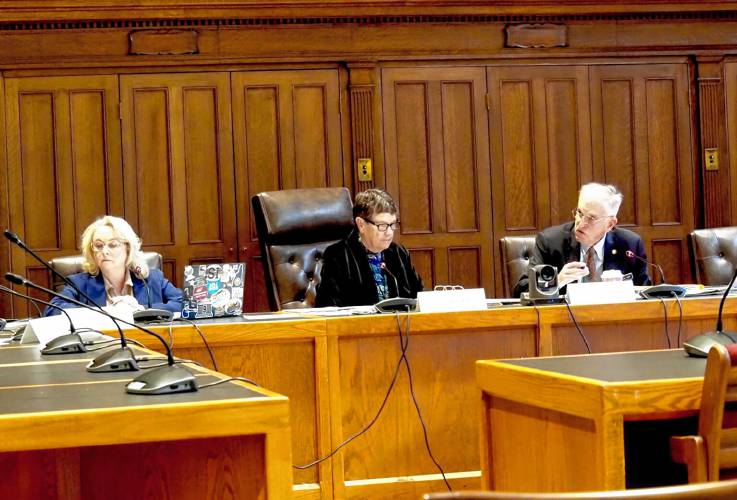 Opinion: The special education gimmick in NH school voucher rules
Opinion: The special education gimmick in NH school voucher rules
 Opinion: What Trump really means by government efficiency
Opinion: What Trump really means by government efficiency

Your Daily Puzzles

An approachable redesign to a classic. Explore our "hints."

A quick daily flip. Finally, someone cracked the code on digital jigsaw puzzles.

Chess but with chaos: Every day is a unique, wacky board.

Word search but as a strategy game. Clearing the board feels really good.

Align the letters in just the right way to spell a word. And then more words.
Politics

Town elections offer preview of citizenship voting rules being considered nationwide
A voter in Milford, New Hampshire, missed out on approving the town’s $19 million operating budget, electing a cemetery trustee and buying a new dump truck. In Durham, an 18-year-old high school student did not get a say in who should serve on the school board or whether $125,000 should go toward replacing artificial turf on athletic fields.
 Medical aid in dying, education funding, transgender issues: What to look for in the State House this week
Medical aid in dying, education funding, transgender issues: What to look for in the State House this week
 On the Trail: Shaheen’s retirement sparks a competitive NH Senate race
On the Trail: Shaheen’s retirement sparks a competitive NH Senate race
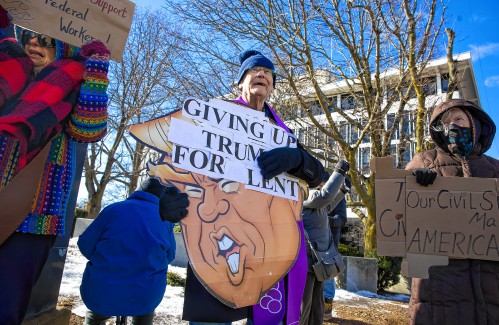 ‘If it affects one, it’s going to affect all’: Dozens protest federal firings in Concord
‘If it affects one, it’s going to affect all’: Dozens protest federal firings in Concord
 On the Trail: Window closing on Shaheen decision to run in 2026
On the Trail: Window closing on Shaheen decision to run in 2026
Arts & Life

Around Concord: Cali Arepa brings ‘a little bit of Colombia’ to the Capital Region
Growing up in Cali, Colombia, the crisp yet soft corn dough of an arepa was a constant in Olga Muriel’s life. So was the dream of one day owning her own business.
 Around Concord: On-stage dynamite, LEE & DR. G are ‘stunningly live’
Around Concord: On-stage dynamite, LEE & DR. G are ‘stunningly live’
Obituaries
 Gracia H. Crowley
Gracia H. Crowley
Gracia "Gracie" H. Crowley Franklin, NH - Franklin, NH - Gracia "Gracie" H. Crowley, a lifelong resident of Franklin, New Hampshire, passed away peacefully on Friday, March 28th, 2025, at the age of 91. Born in Franklin on June 20th, 193... remainder of obit for Gracia H. Crowley
 Derek Todd
Derek Todd
Campton, NH - Derek W Todd of Campton, NH unexpectedly passed away alongside his two dogs on Friday, March 7", 2025 Born August 5", 1982, in Concord, NH To Parents Debra Jackson and Daniel R Todd. He enjoyed living the simple life ... remainder of obit for Derek Todd
 R. Frances Clapp
R. Frances Clapp
Concord, NH - R. Frances Clapp, a beloved mother, grandmother, great-grandmother, aunt and friend, passed away at the age of 87, on March 21, 2025, at Presidential Oaks in Concord, NH, following a period of declining health. Born on... remainder of obit for R. Frances Clapp
 Kenneth Stevens
Kenneth Stevens
Concord, NH - Kenneth Edward Stevens passed away on February 1, 2025 at the age of 89. Kenneth was born on June 24, 1935 in Concord, N.H. to Rita and Bertrand Stevens. On August 29,1952 he enlisted in the U S Airforce and was stationed... remainder of obit for Kenneth Stevens


 Bow High School senior Albushies wins first place, headed to semifinals in 4-Way Speech Contest
Bow High School senior Albushies wins first place, headed to semifinals in 4-Way Speech Contest
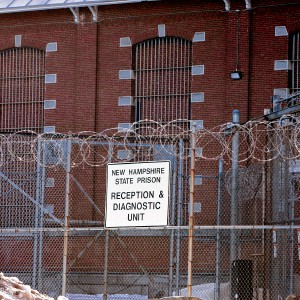 As part of sweeping cuts, House budget writers vote to abolish nearly 200 positions from N.H. Department of Corrections
As part of sweeping cuts, House budget writers vote to abolish nearly 200 positions from N.H. Department of Corrections
 A Super (Mario) Escape at Penacook Elementary School
A Super (Mario) Escape at Penacook Elementary School
 Granite Geek: Moving heat isn’t easy, even (especially?) when it comes from manure
Granite Geek: Moving heat isn’t easy, even (especially?) when it comes from manure
 Ayotte and lawmalers agree on a three-year landfill moratorium in New Hampshire. Is this the final answer?
Ayotte and lawmalers agree on a three-year landfill moratorium in New Hampshire. Is this the final answer?
 Portsmouth man accused of trying to lure Canterbury teen online
Portsmouth man accused of trying to lure Canterbury teen online

 Boys’ hockey: Concord takes championship in historic quadruple overtime victory over BG, 2-1
Boys’ hockey: Concord takes championship in historic quadruple overtime victory over BG, 2-1 Ex-Celtic Enes Kanter Freedom speaks in NH on human rights advocacy
Ex-Celtic Enes Kanter Freedom speaks in NH on human rights advocacy Basketball: Pembroke’s Berkeley, Franklin’s Kaplan win Player of the Year; All-State teams announced
Basketball: Pembroke’s Berkeley, Franklin’s Kaplan win Player of the Year; All-State teams announced Around Concord: Glimpse Gallery, new downtown art hub, opens doors for artists, art lovers
Around Concord: Glimpse Gallery, new downtown art hub, opens doors for artists, art lovers New Hampshire Jewish Film Festival coming to Red River Theaters
New Hampshire Jewish Film Festival coming to Red River Theaters Around Concord: State Street Kitchen provides an incubator space for burgeoning small businesses to cook in community
Around Concord: State Street Kitchen provides an incubator space for burgeoning small businesses to cook in community
